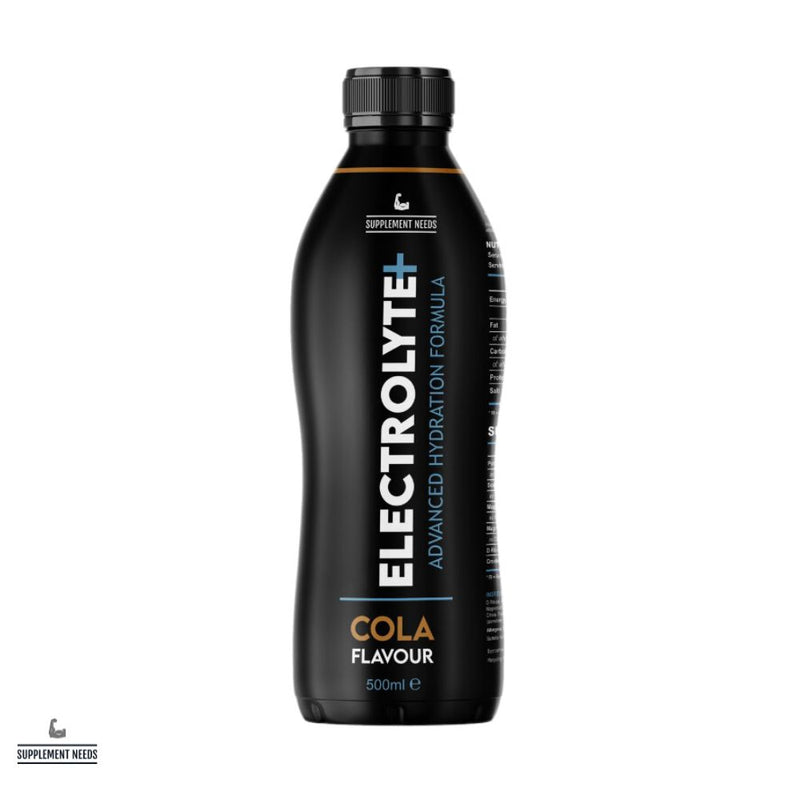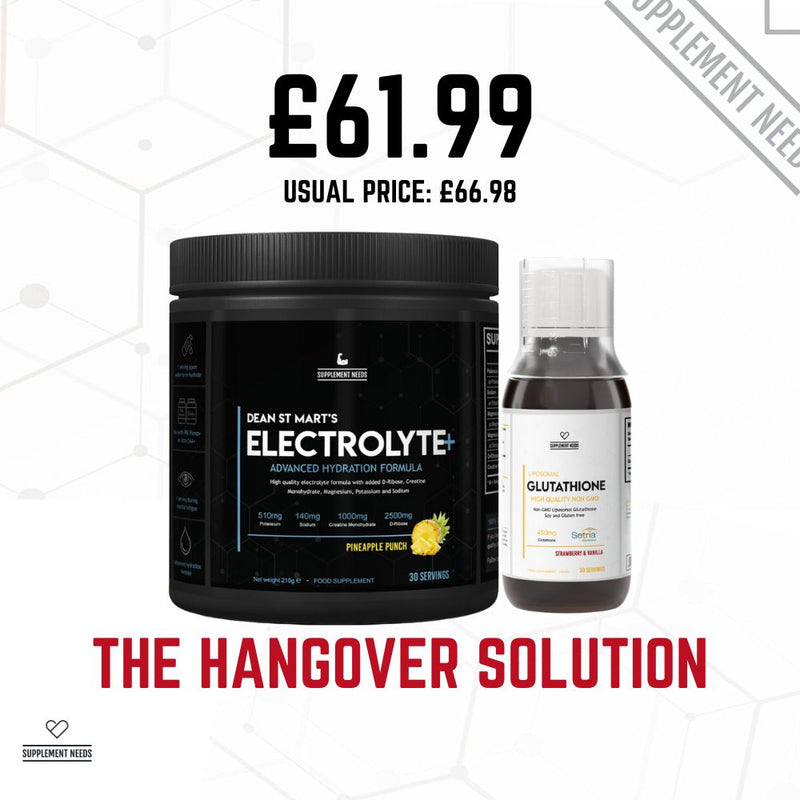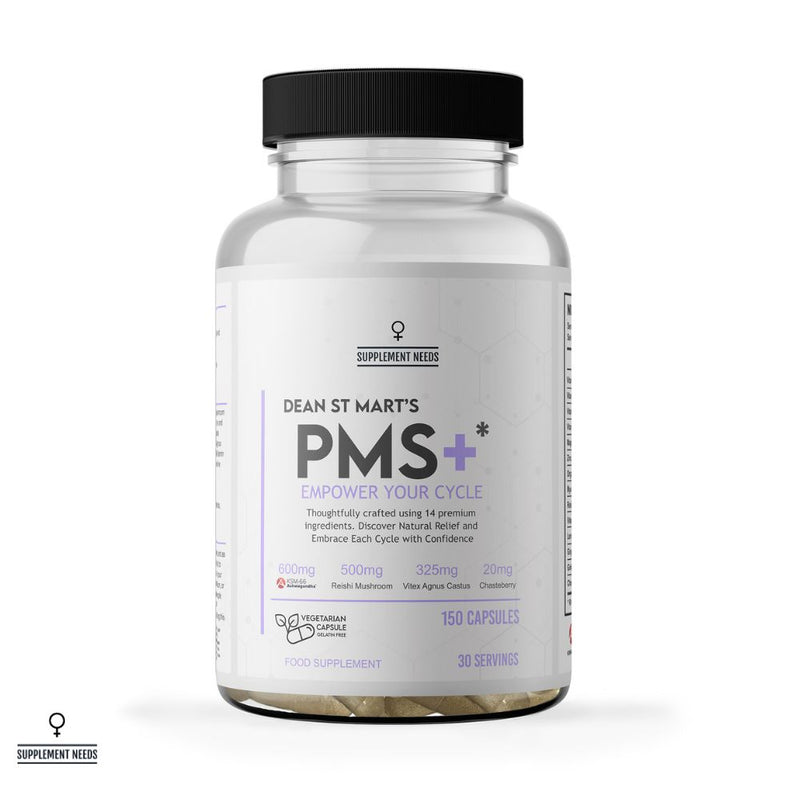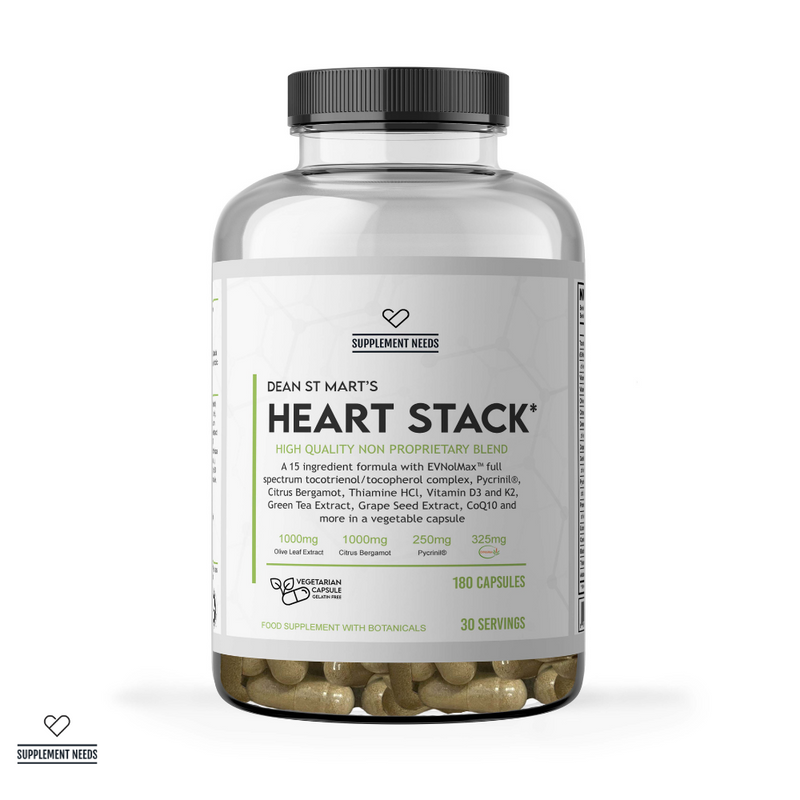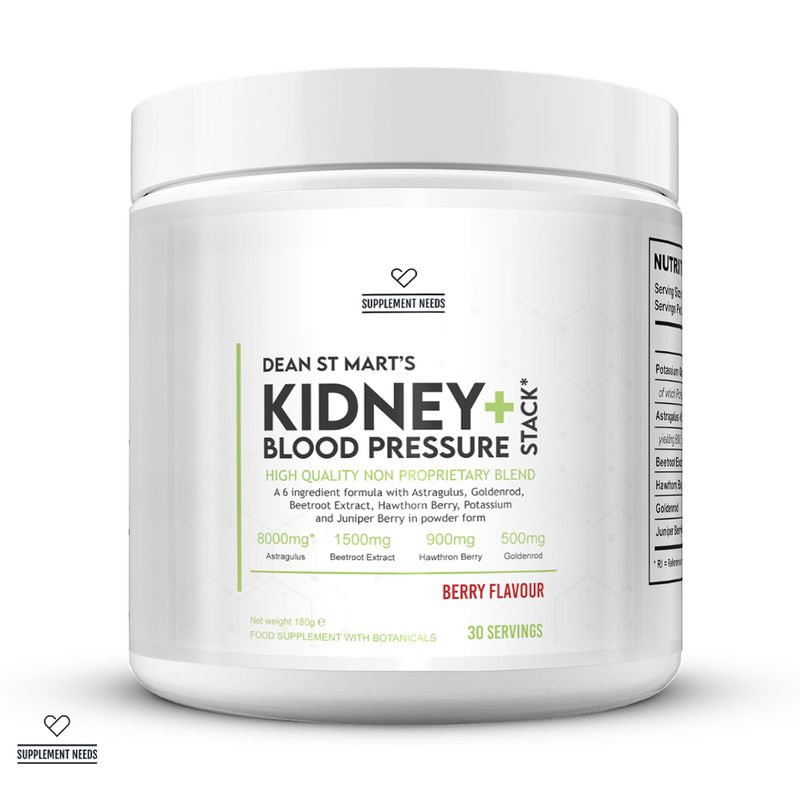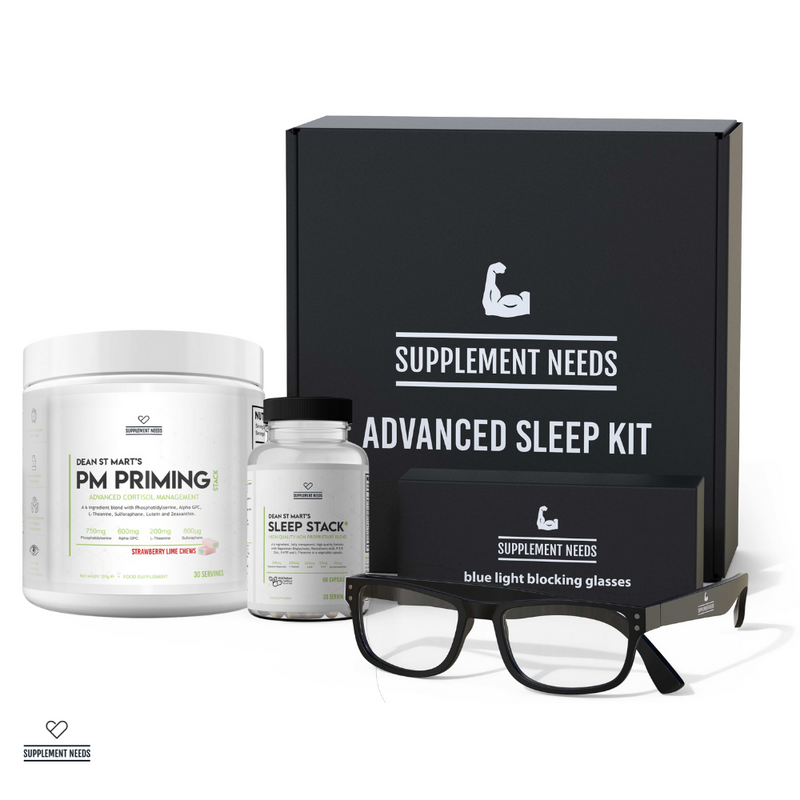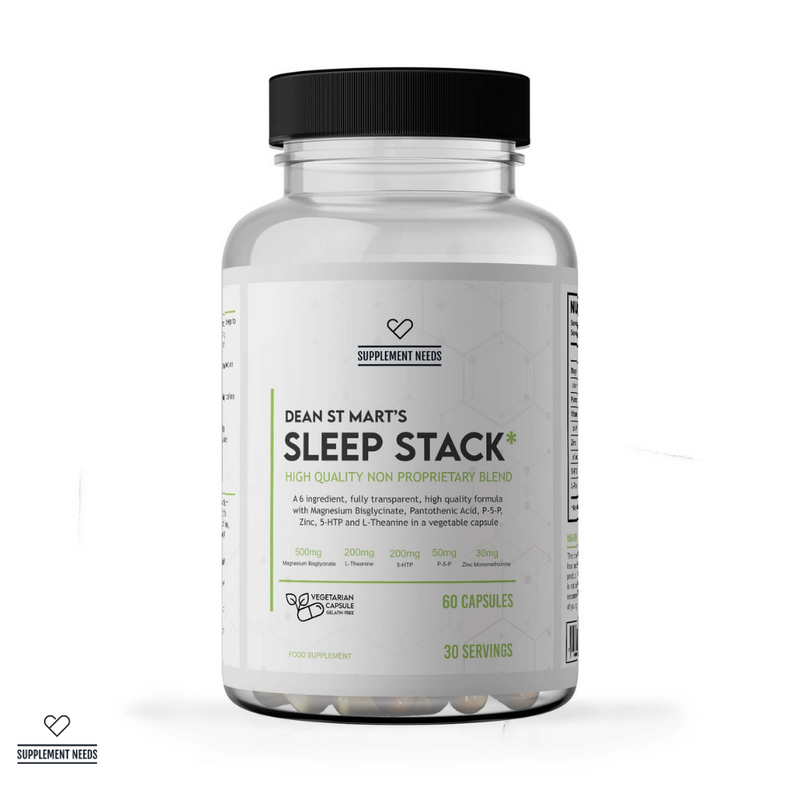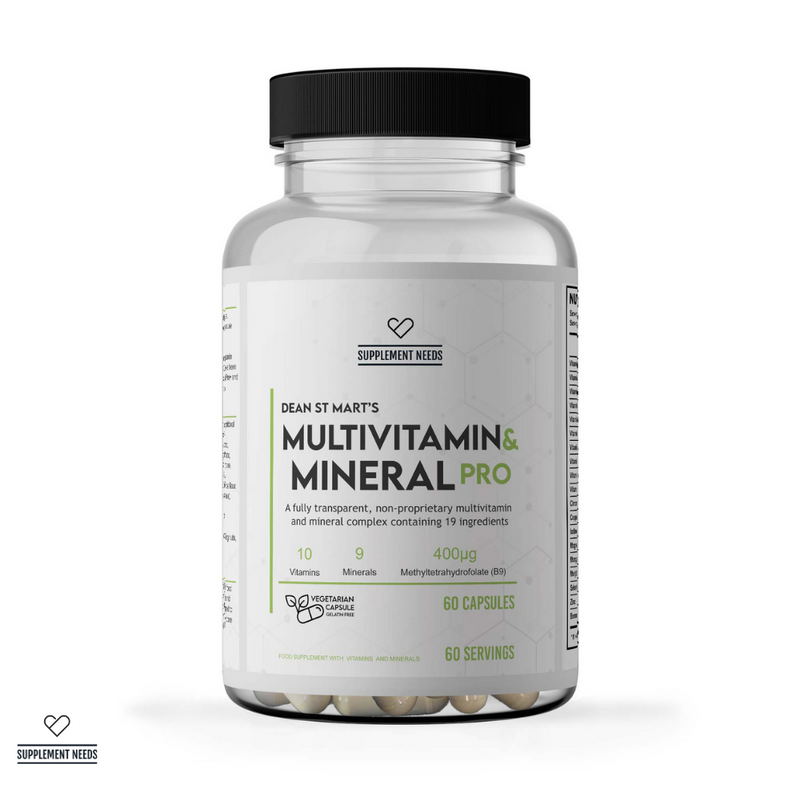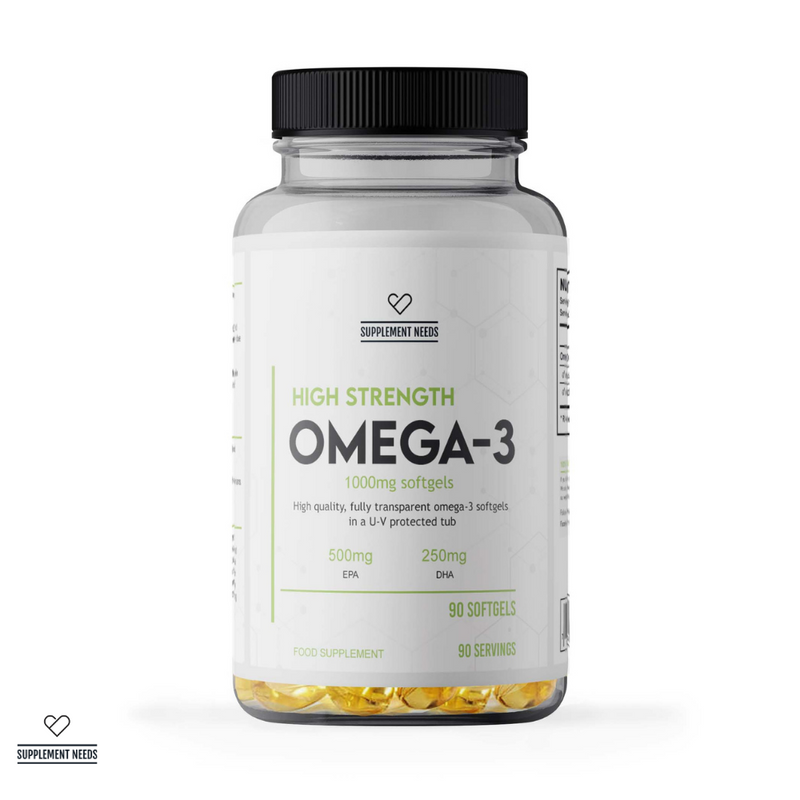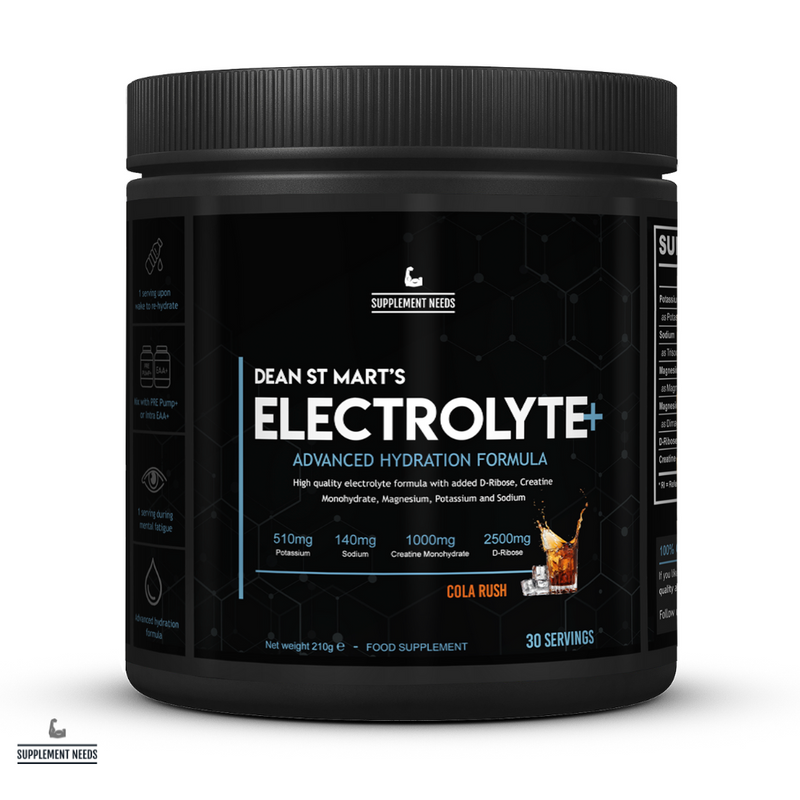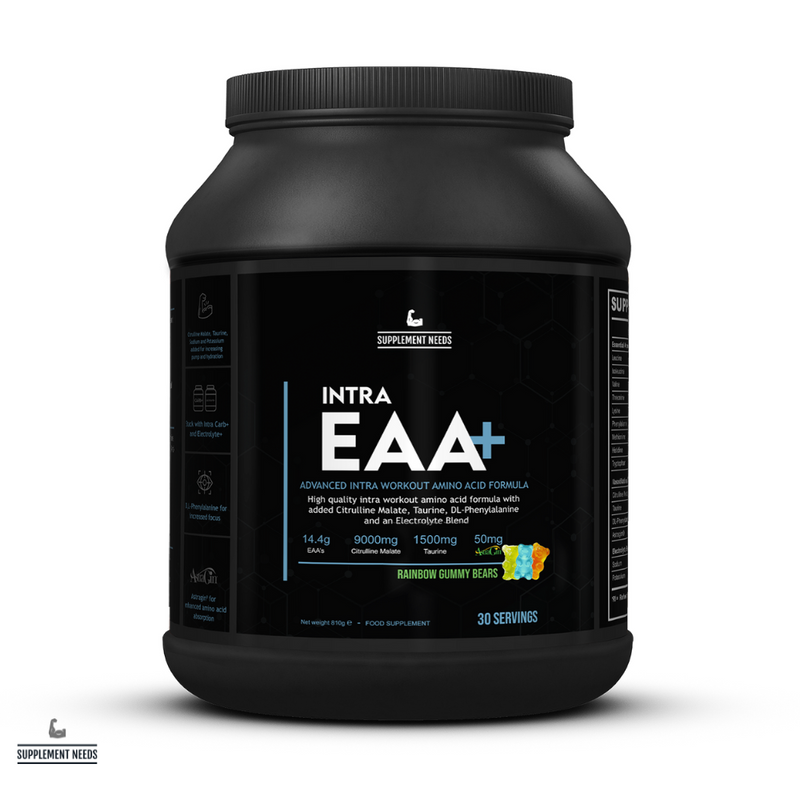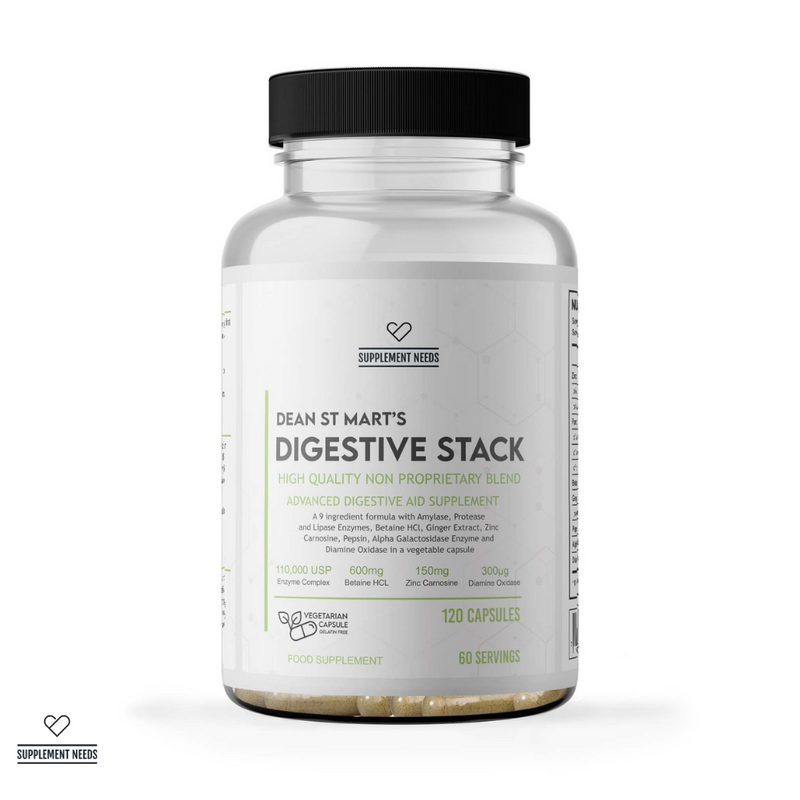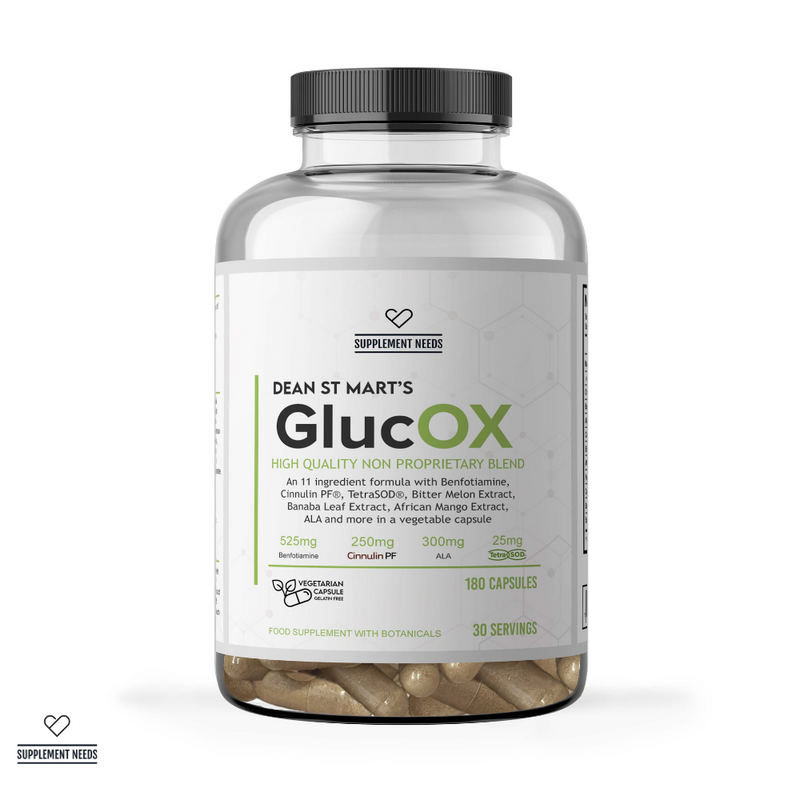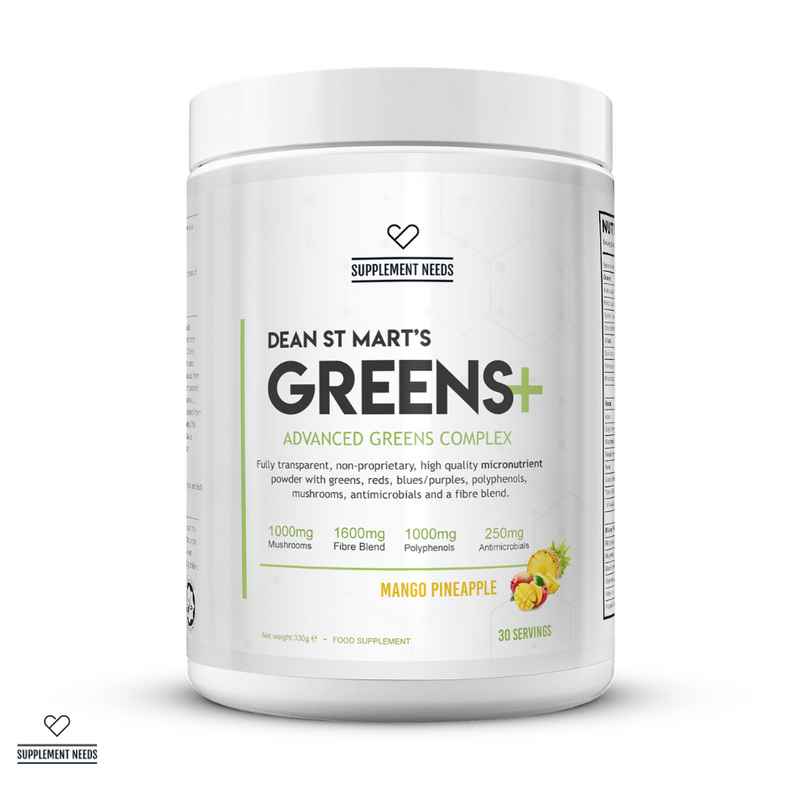As many men enter their forties, they start to pay closer attention to their health. Aside from more regular exercise, many men consider adding supplements to their diet. Sound familiar? If you’re wondering what supplements could form part of your regime after forty, then keep reading…
Do you need to take supplements after 40?
The first question that may occur to you on this topic is “Do I actually need to take supplements after 40?”
Whilst the decision to take supplements is entirely up to you (and any medical professionals you consult with), it can be helpful to think about the changes your body experiences as you age through your forties.
Although every man is different (and ages at different rates), as you enter your forties you may experience the following:
Weight gain
Men often begin to gain weight steadily from their thirties through to approximately 55.
This is as a result of the body’s metabolism (the way the body obtains energy from food) changing. Furthermore, recent research studies1 indicate that lipid turnover in fat tissue decreases during ageing, thus making it easier to ‘gain weight, even if we don’t eat more or exercise less than before’.
This weight typically takes the form of abdominal visceral fat2 (or to use a more common phrase ‘a belly’).
“But, is there any harm in having a bit of a belly?” we can hear you say.
Studies suggest so…
Take a recent study3 - which took the form of a systematic review and meta-analysis of observational studies - published in The BMJ. The study suggests that ‘excess belly fat (is) linked to higher risk of early death regardless of total body fat’.
Visceral fat can also raise your blood cholesterol4, increase your blood pressure5, and increase your risk of developing type 2 diabetes6.
You don’t need to be a scientist or doctor to know that you don’t want to be developing those things in your middle age!
Blood pressure
Closely related to the point above, is blood pressure. In the minds of many people, high blood pressure (which also goes by the name ‘hypertension’) is associated with the elderly.
The reality may surprise you. According to UK Government data7, over 2.1 million adults under 45 had high blood pressure in England in 2015.
High blood pressure can result in myriad negative health outcomes - especially in relation to heart health. As studies8 have indicated, hypertension is a frequent finding in patients with acute myocardial infarction (AMI) (that’s the technical term for a heart attack).
Aside from heart disease, high blood pressure can be an underlying risk factor for other serious health conditions including strokes, kidney disease, and vascular dementia9.
Sleep
Practising proper sleep hygiene is a crucial part of maintaining your health10. Yet, once many men pass the age of 40, obtaining a good night’s sleep becomes increasingly difficult.
According to a study11 conducted in the United States, sleep patterns over the course of a typical lifetime form a ‘U’ pattern, with the age of 40 being the period of life when an individual gets the least amount of sleep.
That may only be a single study, but it gives you an idea of the challenges you may face in order to get a good night’s sleep in your forties.
The health risks associated with poor sleep are multiple. In fact, one review of studies12 that was conducted in 2010, found a link between too little sleep and early mortality.
Loss of muscle mass
Once you hit 40, you may start to find it harder to maintain your current muscle mass.
In fact, as a number of studies13 have demonstrated, muscle mass decreases approximately 3-8% per decade after the age of 30. Furthermore, the rate of muscle loss with ageing is higher in men than women14, as the body is less able to respond to ‘growth signals’. Over time, the balance tips in favour of catabolism vs anabolism. (On that last point, think of catabolism as the ‘tearing down’ of cells as opposed to the anabolic ‘growth’ of cells).
As you would expect, the loss of muscle mass - especially if sustained over longer periods of time - can have adverse effects on your health. Notably, one study15 published in The Journal of Post-Acute and Long-Term Care Medicine found that a person’s muscle mass is a better predictor of health than BMI.
Skin
Your skin is another area where you may start noticing changes as you enter your forties.
For many men, the most notable signs of ageing in relation to their skin will be a loss of volume and elasticity (in other words, things start to sag more!). Your forties are also when you may start to see more wrinkles.
However, it’s important to note that changes to your skin aren’t merely aesthetic.
As scientists have found, skin ages both intrinsically and extrinsically (i.e. because of internal and external factors). Intrinsic ageing ‘proceeds at a genetically determined pace, primarily caused by the build-up of damaging products of cellular metabolism as well as an increasing biological ageing of cells16’.
This is all a way of saying that because of the way your skin ages, it can result in a range of dermatological disorders, not simply aesthetic declines.
The best supplements for men over 40
At this point you’ve hopefully developed a clearer idea of how your body may change as you enter your forties. With that in mind, you may consider adding supplements to your diet. If so, which ones are best for men over 40? Below, we’ve set out some of the types of supplements that men over 40 may benefit from.
Caveat
Before we go on, we want to raise an important caveat. Supplementation should never be seen as a replacement for a healthy diet and regular exercise (just in the same way that pharmaceutical interventions (which often address only symptoms) can’t replace a healthy diet and exercise).
And, as always, if you have any health concerns you should speak to a medical professional as soon as possible. Always consult a medical professional before taking (any dietary) supplementation.
Multivitamin and mineral supplements
If you’re looking to supplement your diet as you reach middle age, then your first stop should be to invest in a quality multivitamin and mineral supplement.
A good quality multivitamin and mineral supplement will contain a blend of water-soluble and fat-soluble vitamins and a selection of minerals.
The types of vitamins you should look for in a multivitamin supplement include:
- The B complex of vitamins (B1, B2, B3, B5, B6, B7, B9, B12).
- Vitamin A.
- Vitamin D.
- Vitamin E.
- Vitamin K.
As we’ve written previously, not all multivitamin and mineral supplements are created equally, so it’s important that you pay close attention to what you’re buying.
In terms of minerals, good ones to look for in multivitamin supplements include:
- Magnesium.
- Molybdenum.
- Selenium.
- Zinc.
Here at Supplement Needs our Multivitamin and Mineral PRO supplement has been formulated by Dr Dean St Mart to contain 19 ingredients - of which 10 are vitamins and 9 are minerals at efficacious doses.
Note - some population groups such as vegans17 or the elderly18 may be deficient in certain essential vitamins such as Vitamin B12 due to potential nutritional deficiencies or absorption issues from ageing, and may benefit from multivitamin supplements that include B12.
Heart supplements
If you’re particularly concerned about your heart health, then you may consider taking some form of heart supplement.
Simply Google ‘heart supplements’ and you’ll be presented with hundreds of possible supplements to choose from.
So, what should you be looking for?
Ideally, you should select a heart supplement that includes antioxidant ingredients. Without going into too much technical detail, antioxidants are molecules that fight free radicals in your body.
Free radicals are highly reactive molecules which are produced as a result of your body’s normal metabolic processes. Free radicals can also be produced when the body is exposed to carcinogens such as tobacco smoke and air pollution.
Why are free radicals so bad?
Because if your body produces too many free radicals (out of balance with the body’s antioxidants), the result is oxidative stress19.
And, what exactly is oxidative stress? Well, it refers to the large chain chemical reactions that can occur in your body when free radicals react with other molecules. These chain chemical reactions can result in damage to the body’s organs and tissues20.
Free radical derived oxidative stress has been reported to be involved in several adverse health conditions, including cardiovascular diseases21.
Antioxidants on the other hand are molecules that fight free radicals, helping to neutralise them. Think of antioxidants as being your body’s ‘defence force’ against excess levels of free radicals.
Whilst the human body can synthesise some of the antioxidants it needs endogenously (meaning the body makes some antioxidants internally), you also source antioxidants exogenously (meaning your body requires some antioxidants from outside the body e.g. food stuffs)22.
A simple analogy to think of when it comes to “oxidative stress” is “rusting” that occurs to metals that are left exposed to the atmosphere. The metal frame on a bike won’t last very long without protection from the elements, the same way your body’s cells and tissue need protection using antioxidants against oxidants (free radicals) that can cause “rusting” inside the body.
Many important antioxidants (known as dietary antioxidants) such as Vitamin A and Vitamin C are widely available in foods of many kinds. However, some people choose to supplement their diets with additional antioxidants.
This is a rather long way of saying that if you’re looking for an antioxidant-focused heart supplement, choose one that contains sufficient amounts of antioxidant vitamins and/or plant extracts that are rich in antioxidant vitamins.
Examples of such ingredients include:
- Olive Leaf Extract.
- Pomegranate Extract.
- Green Tea Extract.
- Licorice Dry Extract.
Higher-end, premium heart supplements will also include vitamin complexes such as EvNolMax - which is a full spectrum tocotrienol/tocopherol Vitamin E complex.
Quality heart supplements also tend to contain other phytochemicals (that is, chemicals produced by plants) such as Co-Enzyme Q10.
Here at Supplement Needs, our Heart Stack supplement consists of a 15 ingredient blend of multiple antioxidant ingredients, including:
- EvNolMax full spectrum tocotrienol/tocopherol Vitamin E complex.
- Pycrinil trademarked artichoke extract.
- Citrus Bergamot.
- Licorice Dry Extract.
- Black Seed Powder.
- Garlic Extract (Allicin).
- Olive Leaf Extract.
- Pomegranate Extract.
- Green Tea Extract.
- Co-Enzyme Q10.
- Astaxanthin.
- Vitamin D3.
- Vitamin K2.
- Thiamine HCI.
Kidney and blood pressure supplements
A common concern amongst men as they reach their forties is hypertension (high blood pressure).
It’s typically one of the most common things a GP will check for during a check-up (here in the UK, every man between the ages of 40 and 74 will be invited for an NHS Health Check every five years. This check includes a measurement of blood pressure).
For this reason, some men decide to invest in a type of blood pressure supplement (in addition to making changes to their lifestyle, diet and levels of physical activity).
But, like other supplements, it can be difficult to know what to look for.
The key is to find a blood pressure supplement that contains ingredients that can contribute towards the lowering of blood pressure.
These ingredients often (but not always) take the form of ‘nutraceuticals’ - that is, ingredients that are derived from food sources that have health benefits in addition to their nutritional benefit.
Ultimately, however, you want to look for a supplement that includes ingredients that have a body of evidence that shows they may have an impact upon blood pressure.
Some examples of these types of ingredients include potassium, magnesium, L-arginine, Vitamin C, cocoa flavonoids, beetroot juice, co-enzyme Q10, controlled-release melatonin, and aged garlic extract23.
Bear in mind that your kidneys also play an important role in maintaining healthy blood pressure. In particular, your kidneys secrete a hormone called ‘renin’ (which is an aspartic protease protein and enzyme) which helps to regulate arterial blood pressure24.
For example, if your blood pressure falls, then your kidneys will secrete renin. Renin then constricts your body’s small blood vessels, thereby increasing blood pressure.
The point of raising this is that the very best blood pressure supplements also address your kidneys.
Take Supplement Needs’ Kidney and Blood Pressure Stack. In addition to including ingredients that may contribute to the maintenance of normal blood pressure (e.g. Potassium Citrate), it also includes ingredients that may support the excretory function of the kidneys (e.g. Juniper Berry).
Lipid supplements
The final supplement that we find to be popular amongst men 40 and over is lipid supplements.
Lipid supplements are typically designed to combine several ingredients that may contribute to the lowering of the ‘bad’ forms of cholesterol.
If you’re new to the world of supplementation and health, then you may have only heard of cholesterol in a negative sense.
However, the reality is that your body contains both good and bad cholesterols.
The ‘bad’ cholesterols are:
- Low density lipoprotein (LDL).
- Non-high density lipoprotein (non-HDL).
These contrast with the ‘good’ cholesterol, which is high-density lipoprotein (HDL).
Note - you should also be aware of ‘triglycerides’. These aren’t cholesterol, but rather another type of fat that can also have a negative effect on your health. Triglycerides are an essential form of energy, and thus aren’t bad per se. But if you have too many of them in your bloodstream, they can adversely impact your health.
LDL cholesterol - if present at excessively high levels - can result in build up of ‘plaque’ on the walls of your blood vessels. Ultimately, this can result in atherosclerosis, which in turn can increase your risk of heart attack and stroke25.
Lipid supplements then, are formulated to include ingredients that may contribute towards a reduction in the ‘bad’ forms of cholesterol.
So, what ingredients should you look for in a lipid supplement?
Niacin
Niacin is one of the water-soluble essential vitamins that your body needs to function. Often going by the name Vitamin B3, Niacin is the generic name for nicotinic acid, nicotinamide, and other related derivatives.
Studies have indicated that Niacin helps to increase the levels of ‘good’ HDL cholesterol within your body whilst also lowering triglycerides in your bloodstream26.
Red yeast rice (Monacolin K)
A form of white rice which is fermented with yeast, red yeast rice is often included in supplements due to the fact that it contains Monacolin K.
Monacolin K is an active compound which has the same chemical makeup as Lovastatin - a commonly prescribed cholesterol lowering medication. As one study27 demonstrates, red yeast rice supplements that contain 5 to 10 mg of Monacolin K demonstrate a cholesterol-lowering effect.
A further study28 suggests that ‘The extract of red yeast rice (RYR) is the most effective cholesterol-lowering nutraceutical on the market’.
It’s very important to note, however, that many red yeast rice supplements on the market contain little to no Monacolin K. When looking for supplements, ensure they contain ‘Red Yeast Rice Extract for Monacolin K’.
As you’d expect from Supplement Needs, our Lipid PRO+ supplement contains red yeast rice extract for Monacolin K.
In short - you can think of Monacolin K as being like a ‘natural statin’!
Arjuna
Terminalia arjuna - which more commonly goes by the name Arjuna - is a small, flowering tree that is commonly found in tropical and subtropical parts of the world.
Arjuna was traditionally prepared as a tonic in ancient societies, using the bark of the Terminalia arjuna.
Today, a series of studies have revealed that Arjuna is ‘a potential cardioprotective agent29’.
A further study30 - which looked at 105 successive patients with coronary heart diseases (CHD) on a randomised, placebo basis - found that Terminalia arjuna tree bark powder ‘has significant antioxidant action that is comparable to Vitamin E. In addition, it also has a significant hypocholesterolemic effect’.
Curcumin (as BCM-95 Bio-Curcumin or NNB CurcuPrime)
Another important ingredient to look for in lipid supplements is curcumin.
Whilst studies indicate that Curcumin has a spectrum of antioxidant, anti-inflammatory, and anti-cancer properties, it has poor bioavailability (meaning it’s difficult for the body to absorb it).
As a result, people have sought ways to create ‘bioenhanced’ forms of curcumin that are more easily absorbed by the body.
An example of this type of bioenhanced curcumin is BCM-95. It has subsequently been shown that ‘curcumin is absorbed early and retained longer from the BCM-95 CG (Biocurcumax) composition compared to normal curcumin as well as from curcumin-lecithin-piperine combination’32.
Another form of bioenhanced curcumin is NNB CurcuPrime which is tetrahydrocurcumin (a metabolite of curcumin), which is also highly bioavailable33.
This is our way of saying - if you’re looking for a lipid supplement that contains curcumin - ensure it is either BCM-95 or NNB CurcuPrime form of curcumin - otherwise you won’t receive an efficacious dose.
That aside, why is curcumin an ingredient to look for in lipid supplements?
The answer lies in the results of several studies. One study34 found that Curcumin ‘may protect patients at risk of CVD through improving serum lipid levels’. However, the study did suggest that ‘Further research is required to resolve uncertainties related to dosage form, dose and medication frequency of curcumin’.
Naturally, Supplement Needs’ Lipid PRO+ contains NNB CurcuPrime.
Note - if you intend to take the Supplement Needs Lipid PRO+ supplement we recommend that you slowly taper up to the recommended dose (5 capsules daily). This is because of something called ‘Niacin flush’. This is a slightly uncomfortable reaction that some people have to ingesting Niacin within a supplement. It’s harmless and will typically disappear after one or two hours. We recommend taking one capsule (daily) for the first five days, and assessing your reaction to Niacin flush before you escalate to the full recommended dose. As studies35 have demonstrated, tolerance to Niacin-induced flushing can develop rapidly.
Find the best supplements for men at Supplement Needs
You’ve just read about some of our most popular supplements for men over 40. However, as you’ll find when you search our online store, we have a huge range of supplements for both health and performance.
These include supplements to support joint health, digestion support, immune health, blood sugar support, hormone support, cortisol management and much more.
Explore the Supplement Needs health range now
Disclaimer
The information on this website should not be used as a substitute for professional medical advice or care. If you have questions about your health, please contact your doctor.
References
1. P. Arner, S. Bernard, L. Appelsved, K.-Y. Fu, D. P. Andersson, M. Salehpour, A. Thorell, M. Rydén, & K. L. Spalding. (2019). Adipose lipid turnover and long-term changes in body weight [online]. Available at: https://www.nature.com/articles/s41591-019-0565-5 (Accessed on 4th October 2023).
2. Andromeda M. Nauli, Sahar Matin. (2019). Why Do Men Accumulate Abdominal Visceral Fat? [online]. Available at: https://www.ncbi.nlm.nih.gov/pmc/articles/PMC6906176/ (Accessed on 4th October 2023).
3. Ahmad Jayedi, Sepideh Soltani, Mahdieh Sadat Zargar, Tauseef Ahmad Khan, Sakineh Shab-Bidar. (2020). Central fatness and risk of all cause mortality: systematic review and dose-response meta-analysis of 72 prospective cohort studies [online]. Available at: https://www.bmj.com/content/370/bmj.m3324 (Accessed on 4th October 2023).
4. Boudewijn Klop, Jan Willem F. Elte, Manuel Castro Cabezas. (2013). Dyslipidemia in Obesity: Mechanisms and Potential Targets [online]. Available at: https://www.ncbi.nlm.nih.gov/pmc/articles/PMC3705344/ (Accessed on 4th October 2023).
5. Shu-Zhong Jiang, Wen Lu, Xue-Feng Zong, Hong-Yun Ruan, Yi Liu. (2016). Obesity and hypertension [online]. Available at: https://www.ncbi.nlm.nih.gov/pmc/articles/PMC5038894/ (Accessed on 4th October 2023).
6. Kanica Yashi, Sharon F. Daley. Obesity and Type 2 Diabetes [online]. Available at: https://www.ncbi.nlm.nih.gov/books/NBK592412/ (Accessed on 4th October 2023).
7. NatCen Social Research, University College London, Department of Epidemiology and Public Health. (2023). Health Survey for England. [data series]. 7th Release. UK Data Service. SN: 2000021. Available at: https://beta.ukdataservice.ac.uk/datacatalogue/series/doi/?id=2000021 (Accessed on 4th October 2023).
8. Roberto Pedrinelli, Piercarlo Ballo, Cesare Fiorentini, Silvia Denti, Maurizo Galderisi, Antonello Ganau, Giuseppe Germanò, Pasquale Innelli, Anna Paini, Stefano Perlini, Massimo Salvetti, Valerio Zacà. (2012). Hypertension and acute myocardial infarction: an overview [online]. Available at: https://pubmed.ncbi.nlm.nih.gov/22317927/ (Accessed on 4th October 2023).
9. NHS (UK). Overview: High blood pressure (hypertension) [online]. Available at: https://www.nhs.uk/conditions/high-blood-pressure-hypertension/ (Accessed on 4th October 2023).
10. Marie-Pierre St-Onge, Michael A. Grandner, Devin Brown, Molly B. Conroy, Girardin Jean-Louis, Michael Coons, Deepak L. Bhatt. Sleep Duration and Quality: Impact on Lifestyle Behaviours and Cardiometabolic Health: A Scientific Statement From the American Heart Association [online]. Available at: https://www.ahajournals.org/doi/10.1161/CIR.0000000000000444 (Accessed on 4th October 2023).
11. Shaoyong Su, Xinyue Li, Yanyan Xu, William V. McCall, Xiaoling Wang. (2022). Epidemiology of accelerometer-based sleep parameters in US school-aged children and adults: NHANES 2011-2014 [online]. Available at: https://www.nature.com/articles/s41598-022-11848-8 (Accessed on 4th October 2023).
12. Francesco P. Cappuccio, Lanfranco D’Elia, Pasquale Strazzullo, Michelle A. Miller. (2010). Sleep Duration and All-Cause Mortality: A Systematic Review and Meta-Analysis of Prospective Studies. Available at: https://www.ncbi.nlm.nih.gov/pmc/articles/PMC2864873/ (Accessed on 4th October 2023).
13. Elena Volpi, Reza Nazemi, Satoshi Fujita. (2004). Muscle tissue changes with aging [online]. Available at: https://www.ncbi.nlm.nih.gov/pmc/articles/PMC2804956/# (Accessed on 4th October 2023).
14. Melissa M. Markofski, Jared M. Dickinson, Micah J. Drummond, Christopher S. Fry, Satoshi Fujita, David M. Gundermann, Erin L. Glynn, Kristofer Jennings, Douglas Paddon-Jones, Paul T. Reidy, Melinda Sheffield-Moore, Kyle L. Timmerman, Blake B. Rasmussen, Elena Volpi. (2015). Effect of age on basal muscle protein synthesis and mTORC1 signaling in a large cohort of young and older men and women [online]. Available at: https://www.sciencedirect.com/science/article/abs/pii/S0531556515000844 (Accessed on 4th October 2023).
15. Josep M. Argilés, Nefertiti Campos, José M. Lopez-Pedrosa, Ricardo Rueda, Leocadio Rodriguez-Manas. (2016). Skeletal Muscle Regulates Metabolism via Interorgan Crosstalk: Roles in Health and Disease [online]. Available at: https://www.jamda.com/article/S1525-8610%2816%2930113-X/fulltext (Accessed on 4th October 2023).
16. Miranda A. Farage, Kenneth W. Miller, Peter Elsner, Howard I. Maibach. (2013). Characteristics of the Aging Skin [online]. Available at: https://www.ncbi.nlm.nih.gov/pmc/articles/PMC3840548/ (Accessed on 4th October 2023).
17. Roman Pawlak, Scott James Parrott, Sudha Raj, Diana Cullum-Dugan, Debbie Lucas. (2013). How prevalent is vitamin B(12) deficiency among vegetarians? [online]. Available at: https://pubmed.ncbi.nlm.nih.gov/23356638/ (Accessed on 4th October 2023).
18. Emmanuel Andres, Noureddine Henoun Loukili, Esther Noel, Georges Kaltenbach, Maher Ben Abdelgheni, Anne Elisabeth Perrin, Marie Noblet-Dick, Frederic Maloisel, Jean-Louis Schlienger, Jean-Frederic Blickle. (2004). Vitamin B(12) cobalamin) deficiency in elderly patients [online]. Available at: https://pubmed.ncbi.nlm.nih.gov/15289425/ (Accessed on 4th October 2023).
19. V. Lobo, A. Patil, A. Phatak, N. Chandra. (2010). Free radicals, antioxidants and functional foods: Impact on human health [online]. Available at: https://www.ncbi.nlm.nih.gov/pmc/articles/PMC3249911/ (Accessed on 4th October 2023).
20. Gabriele Pizzino, Natasha Irrera, Mariapaola Cucinotta, Giovanni Pallio, Federica Mannino, Vincenzo Arcoraci, Francesco Squadrito, Domenica Altavilla, Alessandra Bitto. (2017). Oxidative Stress: Harms and Benefits for Human Health [online]. Available at: https://www.ncbi.nlm.nih.gov/pmc/articles/PMC5551541/ (Accessed on 4th October 2023).
21. Alugoju Phaniendra, Dinesh Babu Jestadi, Latha Periyasamy. (2014). Free Radicals: Properties, Sources, Targets, and Their Implication in Various Diseases. Available at: https://link.springer.com/article/10.1007/s12291-014-0446-0 (Accessed on 4th October 2023).
22. National Cancer Institute. Antioxidants and Cancer Prevention [online]. Available at: https://www.cancer.gov/about-cancer/causes-prevention/risk/diet/antioxidants-fact-sheet (Accessed on 4th October 2023).
23. Claudio Borghi, Arrigo F. G. Cicero. (2017). Nutraceuticals with a clinically detectable blood pressure-lowering effect: a review of available randomised control trials and their meta-analysis [online]. Available at: https://www.ncbi.nlm.nih.gov/pmc/articles/PMC5338151/ (Accessed on 4th October 2023).
24. Hani M Wadei, Stephen C Textor. (2012). The role of the kidney in regulating arterial blood pressure [online]. Available at: https://pubmed.ncbi.nlm.nih.gov/22926246/ (Accessed on 4th October 2023).
25. NHS (UK). Atherosclerosis [online]. Available at: https://www.nhs.uk/conditions/atherosclerosis/ (Accessed on 4th October 2023).
26. Scott M. Gordon, Marcelo J. Amar, Kianoush Jeiran, Michael Stagliano, Emma Staller, Martin P. Playford, Nehal N. Mehta, Tomas Vaisar, Alan T. Remaley. (2020). Effect of niacin monotherapy on high density lipoprotein composition and function [online]. Available at: https://lipidworld.biomedcentral.com/articles/10.1186/s12944-020-01350-3 (Accessed on 4th October 2023).
27. Tina Heinz, Jan Philipp Schuchardt, Katharina Moller, Peyman Hadji, Andreas Hahn. (2016). Low daily dose of 3 mg monacolin K from RYR reduces the concentration of LDL-C in a randomised, placebo-controlled intervention [online]. Available at: https://pubmed.ncbi.nlm.nih.gov/27865358/ (Accessed on 4th October 2023).
28. Arrigo F. G. Cicero, Federica Fogacci, Maciej Banach. (2019). Red Yeast Rice for Hypercholesterolemia [online]. Available at: https://www.ncbi.nlm.nih.gov/pmc/articles/PMC6822657/ (Accessed on 4th October 2023).
29. Shridhar Dwivedi, Deepti Chopra. (2014). Revisiting Terminalia arjuna - An Ancient Cardiovascular Drug [online]. Available at: https://www.ncbi.nlm.nih.gov/pmc/articles/PMC4220499/ (Accessed on 4th October 2023).
30. R Gupta, S Singhal, A Goyle, V N Sharma. (2001). Antioxidant and hypocholesterolaemic effects of Terninalia arjuna tree-bark powder: a randomised placebo-controlled trial [online]. Available at: https://pubmed.ncbi.nlm.nih.gov/11225136/ (Accessed on 4th October 2023).
31. B. Antony, B. Merina, V. S. Iyer, N. Judy, K. Lennertz, S. Joyal. (2008). A Pilot Cross-Over Study to Evaluate Human Oral Bioavailability of BCM-95 CG (Biocurcumax), A Novel Bioenhanced Preparation of Curcumin [online]. Available at: https://www.ncbi.nlm.nih.gov/pmc/articles/PMC2792534/ (Accessed on 4th October 2023).
32. B. Antony, B. Merina, V. S. Iyer, N. Judy, K. Lennertz, S. Joyal. (2008). A Pilot Cross-Over Study to Evaluate Human Oral Bioavailability of BCM-95 CG (Biocurcumax), A Novel Bioenhanced Preparation of Curcumin [online]. Available at: https://www.ncbi.nlm.nih.gov/pmc/articles/PMC2792534/ (Accessed on 4th October 2023).
33. Bharat B. Aggarwal, Lokesh Deb, Sahdeo Prasad. (2015). Curcumin Differs from Tetrahydrocurcumin for Molecular Targets, Signaling Pathways and Cellular Responses [online]. Available at: https://www.ncbi.nlm.nih.gov/pmc/articles/PMC6272158/ (Accessed on 6th October 2023).
34. Si Qin, Lifan Huang, Jiaojiao Gong, Shasha Shen, Juan Huang, Hong Ren, Huaidong Hu. (2017). Efficacy and safety of turmeric and curcumin in lowering blood lipid levels in patients with cardiovascular risk factors: a meta-analysis of randomised control trials [online]. Available at: https://www.ncbi.nlm.nih.gov/pmc/articles/PMC5637251/ (Accessed on 4th October 2023).
35. V. S. Kamanna, S. H. Ganji, M. L. Kashyap. (2009). The mechanism and mitigation of niacin-induced flushing [online]. Available at: https://www.ncbi.nlm.nih.gov/pmc/articles/PMC2779993/ (Accessed on 4th October 2023).
